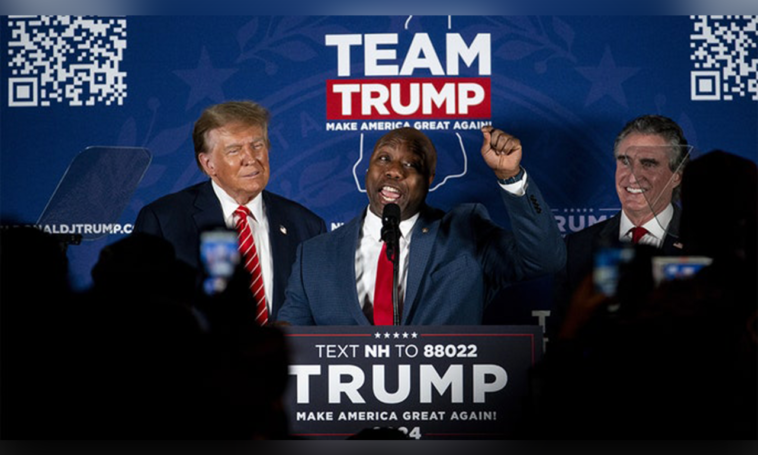Republican Senator Tim Scott injected humor into a New Hampshire crowd during the celebration of former President Donald Trump’s victory in the state’s Republican primary.
The comedic moment unfolded as Trump playfully suggested that Scott “must really hate” GOP presidential candidate Nikki Haley, the former governor of South Carolina who appointed Scott to the Senate in 2012.
Trump, reveling in his success in South Carolina, highlighted the endorsements he received from the state’s political figures. Standing behind Trump on stage, Scott became the subject of the former president’s banter.
Trump drew attention to Scott’s recent endorsement of him over Haley, despite her pivotal role in appointing Scott to the Senate. The comment added a humorous twist to the political event, with Trump jokingly implying a playful rivalry between Scott and Haley.
The crowd’s laughter underscored the light-hearted atmosphere on stage, emphasizing the entertainment aspect of political events. Trump’s knack for incorporating humor into his speeches and interactions has been a trademark of his political style, contributing to his connection with supporters.
As Trump teased Scott about his endorsement choice, the senator approached the microphone and responded with affectionate admiration for the former president. The crowd’s laughter continued, and Trump playfully attributed Scott’s comment to his skills as a politician, emphasizing the senator’s ability to navigate such situations. The exchange reflected the unique blend of camaraderie and political strategy often observed in the GOP.
Beyond the comedic value, the banter between Trump, Scott, and the crowd provided insight into the intricate dynamics of the Republican Party, particularly within the context of the upcoming South Carolina primary.
Trump’s commanding lead in polls for the state’s primary underscored his enduring influence within the GOP. Despite Haley’s determined vow to continue her campaign, Trump’s popularity among Republican voters remained evident.
The playful exchange also revealed the significance of endorsements in the political landscape. Scott’s decision to endorse Trump, despite his connection to Haley, highlighted the intricate web of alliances and loyalties within the party. Endorsements from influential figures can significantly impact the trajectory of a candidate’s campaign, as evident in this light-hearted but politically charged moment.
The banter between Trump, Scott, and the crowd provided a glimpse into the interconnected relationships and rivalries that shape the Republican Party’s internal dynamics.
It showcased the ability of political figures to navigate these dynamics while maintaining a sense of humor, a quality that resonates with many voters.
Moreover, the humorous interaction served as a reminder of the performative nature of political events. Trump, known for his entertainment-centric approach to politics, often turns campaign rallies into theatrical performances, blending policy discussions with humor and crowd interaction. This fusion of politics and entertainment has been a defining feature of Trump’s political brand.
As the South Carolina primary approached, the banter on stage became emblematic of the broader dynamics within the GOP. The party’s internal struggles, shifting alliances, and the influence of key figures like Trump and Haley played out in real-time.
The crowd’s positive response indicated the audience’s engagement with the theatrics of political rallies, highlighting the enduring appeal of Trump’s style.
The comedic exchange between Trump, Scott, and the crowd in New Hampshire offered a captivating snapshot of the intricate world of Republican politics. It showcased the interplay of personalities, alliances, and endorsements within the GOP, emphasizing the performative aspect of political events. As the primary season unfolded, the entertainment value of such interactions continued to shape the narrative of the Republican Party and its evolving dynamics.




Join the Community and Be a Part of the Conversation
You must be logged in or registered to post a comment.